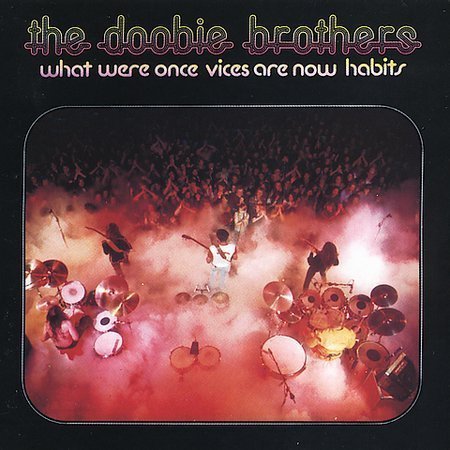
What Were Once Vices Are Now Habits
by The Doobie Brothers (1974)
The Doobie Brothers were one of the first bands I liked enough to buy one of their albums. In my early adolescence, I had heard several of their songs on the radio, and gladly traded in some allowance money for their Greatest Hits cassette tape, the one with the miniature jukebox on the cover. Their music was an eclectic mix of rock, soul, blues, funk, and country (and then incorporated elements of jazz after Michael McDonald took over as lead singer in 1976).
I was unaware, at the age of 12, that their name referred to a certain kind of mood-altering cigarette. When it turned out that "Doobie" wasn't the surname of all the band members, I withheld this information from my mother for fear of having my cassette tape confiscated. But it probably didn't matter. Mom, it turned out, was into the Doobie Brothers, and I even got her to go with me to their concert down at the Civic Center.
A friend in high school referred to their music as "Jesus rock," based on the fact that they had a song called "Jesus is Just Alright," and, according to my friend, the song "Takin' it to the Streets" was about spreading the Christian gospel. It didn't really matter to me whether or not they were religious. I had different reasons for liking the band. Their songs were permeated with the kind of hippie idealism that appealed to me, with optimistic lyrics about a world where war and hatred were becoming obsolete. I also liked the fact that they looked like hippie freaks, or possibly even members of a motorcycle gang.
My favorite Doobie Brothers album was their overlooked masterpiece What Were Once Vices Are Now Habits. I must have listened to this album a couple of hundred times in my early teenage years. It contained their hit song "Black Water," which I appropriated as my personal anthem. The soaring melody of the chorus, with the lyric "I ain't got no worries 'cause I ain't in no hurry at all," seemed like a declaration of independence from society's rat race and the pressures of conformity. Closer examination of the song's lyrics suggests that it may have been inspired by Mark Twain's Huckleberry Finn, with references to a laid-back lifestyle on the Mississippi River.
Vices finds lead guitarists/singers Johnston and Simmons at the top of their songwriting game, turning out memorable hooks like an American Lennon and McCartney. The album is expertly produced by Ted Templeman (who became Van Halen's producer three years after this recording) and makes full use of multi‑track recording technology. Along with the Doobies' standard rich vocal harmonies, you hear diverse types of guitar, percussion, and keyboard. Several songs feature a classy R&B-style horn section.
Two of the more rockin' songs on the album are devoted to the subject of women. "Pursuit on 53rd Street" features the memorable words, "I got to lay me a line on the lady before she gets down the street too far." "Road Angel" finds the Doobies in a disagreement over the moral character of an attractive hitchhiker. When it is revealed that the girl has a fondness for whiskey, the singer's response is: "I don't believe it, don't believe a word." Another hard-rocker, "Down in the Track," is a bleak depiction of the life of a black man in a southern chain-gang.
The album ends with three stunningly good compositions. "Another Park, Another Sunday," is a bittersweet ode to lost love by Tom Johnston. It is nicely orchestrated with layered acoustic guitars, vocals and a mellow vibraphone. The repeating chorus at the end slowly fades into the peaceful ocean waves that begin Pat Simmons' equally remarkable "Daughters of the Sea," an uplifting song with lyrics that seem inspired by the mythological Sirens. However, these "dizzy dancing golden ladies" on the seashore seem more like a source of inspiration for Simmons than a danger. Maybe he has unwittingly fallen under their spell. The album finishes with bassist Tiran Porter's perfectly understated instrumental, "Flying Cloud." As a teenager, these last three songs together always left me with a feeling of peacefulness. To get the full effect, you should definitely listen with some decent quality headphones.
After all these years, What Were Once Vices Are Now Habits is still one of my all time favorites. If you appreciate rock music from the mid-seventies, you owe it to yourself to get a copy of this CD.
Reviewed by Somebody 5/1/11
See more Favorite Albums of the Moment





